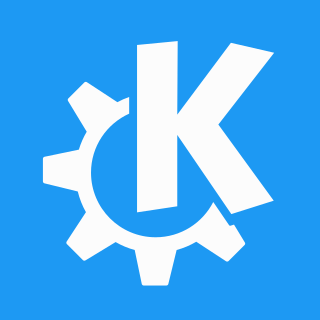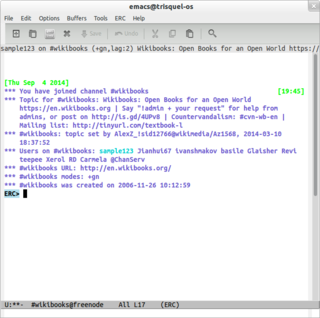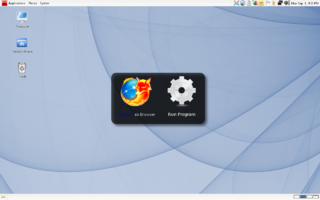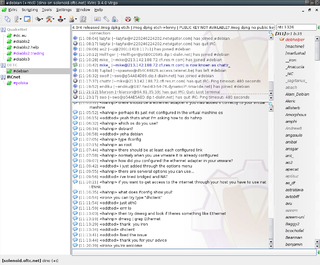
KDE is an international free software community that develops free and open-source software. As a central development hub, it provides tools and resources that allow collaborative work on this kind of software. Well-known products include the Plasma Desktop, KDE Frameworks, and a range of cross-platform applications such as Amarok, digiKam, and Krita that are designed to run on Unix and Unix-like operating systems, Microsoft Windows, and Android.

Konqueror is a free and open-source web browser and file manager that provides web access and file-viewer functionality for file systems. It forms a core part of the KDE Software Compilation. Developed by volunteers, Konqueror can run on most Unix-like operating systems. The KDE community licenses and distributes Konqueror under GNU GPL-2.0-or-later.

A Linux distribution is an operating system made from a software collection that includes the Linux kernel, and often a package management system. Linux users usually obtain their operating system by downloading one of the Linux distributions, which are available for a wide variety of systems ranging from embedded devices and personal computers to powerful supercomputers.

ERC is an Internet Relay Chat (IRC) client integrated into GNU Emacs. It is written in Emacs Lisp.
Technical variations of Linux distributions include support for different hardware devices and systems or software package configurations. Organizational differences may be motivated by historical reasons. Other criteria include security, including how quickly security upgrades are available; ease of package management; and number of packages available.

Kubuntu is an official flavor of the Ubuntu operating system that uses the KDE Plasma Desktop instead of the GNOME desktop environment. As part of the Ubuntu project, Kubuntu uses the same underlying systems. Kubuntu shares the same repositories as Ubuntu and is released regularly on the same schedule as Ubuntu.
The following tables compare general and technical information between a number of notable IRC client programs which have been discussed in independent, reliable prior published sources.

Katapult is a free application launcher for the TDE desktop environment. Original development ceased in 2008, but it's been maintained by the TDE developers ever since.

PulseAudio is a network-capable sound server program distributed via the freedesktop.org project. It runs mainly on Linux, various BSD distributions such as FreeBSD and OpenBSD, macOS, as well as Illumos distributions and the Solaris operating system. It serves as a middleware in between applications and hardware and handles raw PCM audio streams.

Jami is a SIP-compatible distributed peer-to-peer softphone and SIP-based instant messenger for Linux, Microsoft Windows, macOS, iOS, and Android. Jami was developed and maintained by the Canadian company Savoir-faire Linux, and with the help of a global community of users and contributors, Jami positions itself as a potential free Skype replacement.

WeeChat is a free and open-source Internet Relay Chat client that is designed to be light and fast. It is released under the terms of the GNU GPL-3.0-or-later and has been developed since 2003.

Smuxi is a cross-platform IRC client for the GNOME desktop inspired by Irssi. It pioneered the concept of separating the frontend client from the backend engine which manages connections to IRC servers inside a single graphical application.

Ubuntu One is an OpenID-based single sign-on service operated by Canonical Ltd. to allow users to log onto many Canonical-owned Web sites. Until April 2014, Ubuntu One was also a file hosting service and music store that allowed users to store data "in the cloud".

rekonq was a lightweight, QtWebKit-based web browser developed inside the free software project KDE. It is the default web browser of Chakra GNU/Linux, and was formerly of Kubuntu. rekonq has been officially included in KDE Extragear since 25 May 2010. In contrast to Konqueror, a web browser and file manager also developed by KDE, rekonq aims to be a standalone and simple web browser. Its code was initially based on Qt Development Frameworks' QtDemoBrowser and is developed on KDE Projects' Git repository.

KVIrc is a graphical IRC client for Linux, Unix, Mac OS and Windows. The name is an acronym of K Visual IRC in which the K stands for a dependency to KDE, which became optional from version 2.0.0. The software is based on the Qt framework and its code is released under a modified GNU General Public License.

Quassel IRC, or Quassel, is a graphical, distributed, cross-platform IRC client, introduced in 2008. It is released under the GNU General Public License version 2 and version 3, for GNU and Unix-like operating systems, macOS, and Microsoft Windows. It has also been ported to OS/2 Warp due to its cross-platform nature. Since the release of Kubuntu 9.04 Quassel is Kubuntu's default IRC client. Quassel uses the Qt application framework.

LightDM is a free and open-source X display manager that aims to be lightweight, fast, extensible and multi-desktop. It can use various front-ends to draw the user interface, also called Greeters. It also supports Wayland.

The Trinity Desktop Environment (TDE) is a complete software desktop environment designed for Linux and Unix-like operating systems, intended for computer users preferring a traditional desktop model, and is free/libre software. Born as a fork of KDE 3.5 in 2010, it was originally created by Timothy Pearson, who had coordinated Kubuntu remixes featuring KDE 3.5 after Kubuntu switched to KDE Plasma 4.
Mir is a computer display server and, recently, a Wayland compositor for the Linux operating system that is under development by Canonical Ltd. It was planned to replace the currently used X Window System for Ubuntu; however, the plan changed and Mutter was adopted as part of GNOME Shell.
















